Aichi and more
- Sort by
- Popularity
- Name
-
Tokoname ware Tokoname yaki
- Ceramic
- Aichi
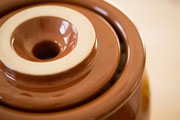
Tokoname ware (Tokoname yaki in Japanese) is a form of ceramic pottery that is produced in the area around the city of Tokoname in Aichi prefecture. This traditional craft comes from one of the Six Ancient Kilns of Japan. Along with Bizen, Tamba, …
View more
-
Otani ware Otani yaki
- Ceramic
- Tokushima
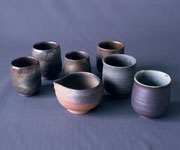
Otani ware (called Otani yaki in Japanese) is a form of ceramics that is the most famous product of the city of Naruto in Tokushima prefecture, and is the representative craft for the prefecture. The notable characteristics of Otani ware are its s…
View more
-
Akazu ware Akazu Yaki
- Ceramic
- Aichi
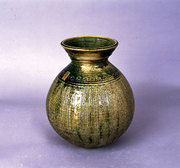
Akazu ware (called Akazu yaki in Japanese) is a form of pottery produced around Akazucho in the eastern part of the city of Seto, Aichi prefecture. This craft is a type of Seto ware, one of Japan's Six Ancient Kilns. Together with Bizen, Tamb…
View more
-
Toyohashi brushes Toyohashi fude
- Writing tools
- Aichi
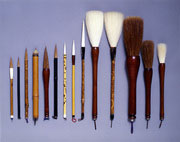
Toyohashi brushes are calligraphy brushes produced in the area around the city of Toyohashi, Aichi prefecture. They are known as high quality brushes and the favorite of many calligraphers. There are over a hundred types of brushes that are not on…
View more
-
Nagoya textiles Nagoya yuzen
- Dyed textiles
- Aichi
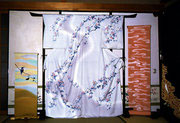
Nagoya yuzen is a cloth that is dyed and painted through a range of traditional techniques that are unique to the city of Nagoya, Aichi prefecture. The designs used for this craft range from monochromatic, color gradation, or classical motifs, but…
View more
-
Awa traditional Japanese paper Awa washi
- Traditional Japanese paper
- Tokushima
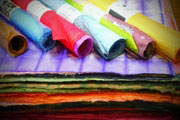
Awa washi is traditional Japanese paper made in Yoshinogawa, Naka-cho, and Ikeda-cho in Tokushima prefecture. It is produced using the traditional papermaking methods of nagashisuki (papermaking in flowing water), and tamesuki (papermaking using s…
View more
-
Nagoya Buddhist altar Nagoya butsudan
- Household Buddhist altars
- Aichi
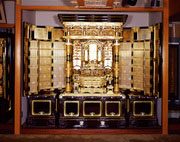
Nagoya Buddhist Altars (called Nagoya Butsudan in Japanese) are produced around the city of Nagoya, Aichi prefecture. Usually high grade trees such as Japanese cypress, zelkova, or sandalwood are used for the base. Nagoya Buddhist Altars have a hi…
View more
-
Owari Cloisonné Owari shippo
- Other crafts
- Aichi

Owari Cloisonné (called Owari Shippo in Japanese) is a type of enamelware, produced in Ama and Nagoya, Aichi prefecture, that is decorated with vibrant colorful designs often depicting natural scenery or the beauty of nature. The name shippo refer…
View more
-
Arimatsu tie-dyeing Arimatsu narumi shibori
- Dyed textiles
- Aichi
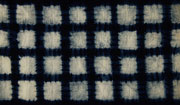
Arimatsu Narumi Shibori is a tie-dye fabric produced in the area surrounding Nagoya, Aichi prefecture. Many of the tie-dye products in Japan are produced here. The tie-dye products are designated as a traditional national craft. Arimatsu Narumi Sh…
View more
-
Mikawa Buddhist altar Mikawa butsudan
- Household Buddhist altars
- Aichi
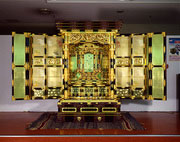
Mikawa Buddhist Altars, called Mikawa Butsudan in Japanese, are made in the Mikawa area of Okazaki, Aichi prefecture. In the region, as it was a custom to place a Buddhist altar in the closet, there were demands to make the pedestal of the altar l…
View more
-
Seto-sometsuke ware Seto sometsuke yaki
- Ceramic
- Aichi
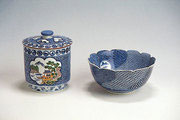
Seto Sometsuke ware (called Seto Sometsuke yaki in Japanese) is ceramic ware produced near the cities of Seto and Owariasahi in Aichi prefecture. The term sometsuke is normally used when designs are painted on porcelain with an indigo blue pigment…
View more
-
Awa-shijira cotton cloth Awa shoai shijira ori
- Woven textiles
- Tokushima

Awa Shoai Shijira Ori is a cotton textile produced in Tokushima City, Tokushima Prefecture. Shijira Ori had been produced in Awa since the 18th century, and the Shijira Ori dyed with Awa indigo was referred to as Awa Shoai Shijira Ori. It was desi…
View more
-
Nagoya kimono-dyeing Nagoya kuromontsuki zome
- Dyed textiles
- Aichi
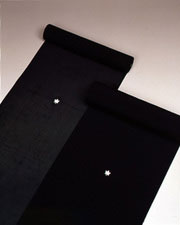
Nagoya Kuromontsuki Zome is a dyed and woven textile produced in the region surrounding Nagoya City, Aichi Prefecture. Kuromontsuki is a kimono worn at weddings or funerals and it has been popular since the Edo period (1603 - 1868) in Nagoya among…
View more
-
Nagoya traditional paulownia chest Nagoya kiri tansu
- Wood, bamboo crafts
- Aichi
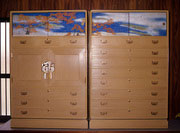
Nagoya traditional paulownia chests of drawers called Nagoya Kiri Tansu in Japanese, are masterpieces of traditional woodwork made in and around Kasugai City and Nagoya City, Aichi Prefecture. Nagoya Kiri Tansu are a traditional craftwork originat…
View more
-
Okazaki stonemasonry Okazaki sekkohin
- Stonework
- Aichi
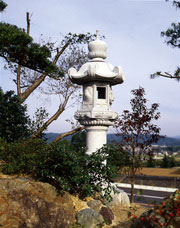
Okazaki Stonemasonry, called Okazaki Sekkouhin in Japanese, are stone crafts and gem carvings produced in the area around the city of Okazaki in Aichi prefecture. They are made using traditional masonry skills that were found and developed in the …
View more
-
Nagoya Sekku Kazari Nagoya Sekku Kazari
- Dolls, kokeshi
- Aichi
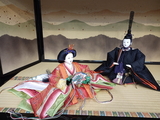
Nagoya Sekku Kazari (festival dolls and decorations) are decorations that are essential for festivals to celebrate the birth of a child and wish for the child's healthy growth. The Sekku Kazari consist of three crafts; dolls, celebratory fla…
View more
-
Owari Buddhist altar equipment Owari butsugu
- Household Buddhist altars
- Aichi

Owari Buddhist altar equipment is made in Nagoya and neighboring cities in Aichi prefecture called the Owari suburbs. Owari Buddhist altar equipment was first founded as a religious craft by the missionaries of the forefather of the Jodo-shinshu s…
View more
-
Sanshu Onigawara Crafts Sanshu onigawara kogeihin
- Ceramic
- Aichi
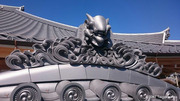
Sanshu Onigawara Crafts, called Sanshu Onigawara Kougeihin in Japanese, are a traditional craft mainly produced in Hekinan, Anjo and Takahama of Aichi Prefecture. The name "Sanshu" comes from the old name of this region in Aichi. The reg…
View more
- 1

































































































































































































































































































